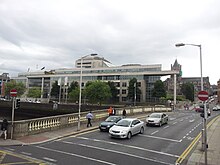O'Donovan Rossa Bridge
History
1684 bridge
Replacing a short-lived wooden structure, the original masonry bridge on this site was built in 1684 as a five-span simple arch bridge, and named Ormonde Bridge. The construction was overseen by William Robinson.
Between 1752 and 1761, George Semple and his brother John Semple I were consulted on the design and maintenance of the bridge and the possible construction of a new bridge.
In December 1802 this bridge was swept away during a severe storm which also damaged Ringsend Bridge and Lucan Bridge.
1813 bridge
In 1813 construction started on a replacement bridge – the current structure – a little further west to the designs of James Savage and was opened in 1816. It consists of three elliptical arch spans in granite, with sculptured heads, similar to those on O'Connell Bridge, on the keystones. The heads represent Plenty, the Liffey, and Industry on one side, with Commerce, Hibernia and Peace on the other. The balustrades are of cast iron.
Opened as Richmond Bridge (named for Charles Lennox, 4th Duke of Richmond, Lord Lieutenant of Ireland), it was renamed in 1923 for Jeremiah O'Donovan Rossa by the fledgling Free State.
References
- ^ Project history of Dublin's River Liffey bridges (PDF). Bridge Engineering 156 Issue BE4 (Report). Phillips & Hamilton. Archived from the original (PDF) on 12 August 2017. Retrieved 8 August 2008.
- ^ "Droichead Uí Dhonnabháin Rosa / O'Donovan Rossa Bridge". Logainm.ie - Database of Placenames' Commission. Retrieved 5 December 2016.
- ^ "Robinson, Sir William | Dictionary of Irish Biography". www.dib.ie. Retrieved 1 September 2023.
- ^ "CO. DUBLIN, DUBLIN, ORMOND BRIDGE Dictionary of Irish Architects -". www.dia.ie. Retrieved 31 August 2023.
- ^ "Exceptional Weather Events" (PDF). met.ie. Retrieved 1 September 2023.
- ^ O'Donovan Rossa Bridge at Structurae
- ^ "O'Donovan Rossa Bridge". Architecture of Dublin City. Archiseek. 2010.
